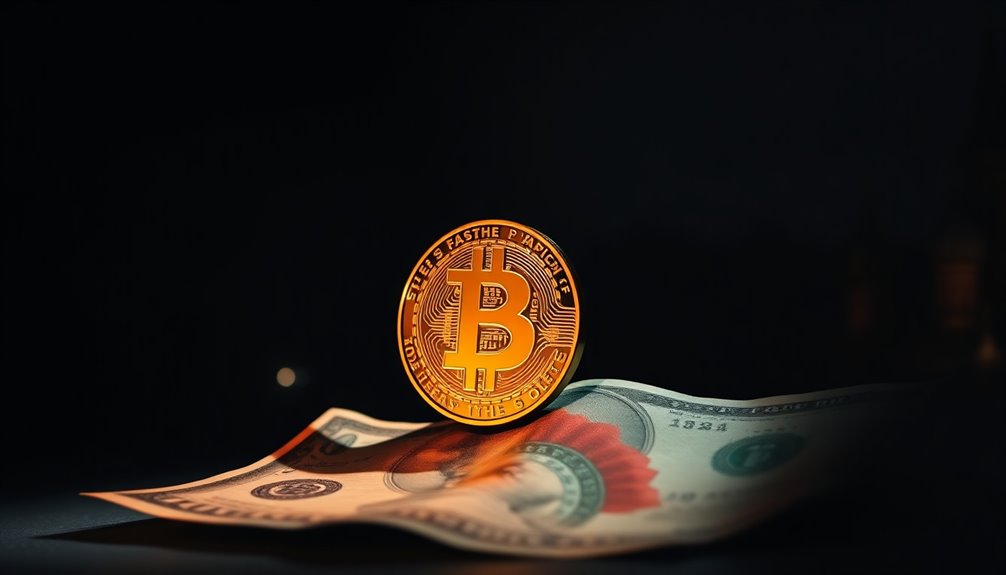Putin's endorsement of Bitcoin marks a historic pivot in global finance, positioning Russia to challenge the dollar's dominance. By legalizing cryptocurrency and fostering mining, Russia aims for economic independence amid Western sanctions. This new framework allows for cross-border Bitcoin transactions, offering a stable alternative to traditional currencies. With BRICS nations exploring de-dollarization, Bitcoin's decentralized nature appeals to economies seeking to resist government control. As global crypto adoption surges, you might find that Putin's strategic move could profoundly shift financial landscapes in the coming years. Keep an eye on how these dynamics unfold.
Key Takeaways
- Putin's endorsement of Bitcoin marks a pivotal shift towards cryptocurrency acceptance, potentially undermining the dollar's dominance in global finance.
- Russia's new regulatory framework for cryptocurrency mining supports economic independence and positions Bitcoin as a strategic asset against Western sanctions.
- The growing adoption of Bitcoin in lower and middle-income countries highlights its potential to challenge traditional currencies like the USD.
- BRICS nations are actively pursuing de-dollarization, which could elevate Bitcoin's role in international trade and reduce reliance on the dollar.
- Bitcoin's decentralized nature offers a hedge against economic uncertainties, appealing to countries looking to stabilize their economies amid geopolitical tensions.
Putin's Bold Bitcoin Endorsement

Russian President Vladimir Putin has made headlines with his bold endorsement of Bitcoin, calling it "unstoppable" and emphasizing its decentralized nature. This marks a significant shift in the Russian government's stance on cryptocurrencies, as Putin openly acknowledged Bitcoin's resilience and stated it can't be banned. His comments were made during a forum in Moscow, where he highlighted Bitcoin's potential role in next-generation payment systems.
In addition to his endorsement, new laws signed by Putin on August 8th legalize cryptocurrency mining and allow for its use in international payments. This represents a departure from the Central Bank of Russia's previous push for a complete ban on cryptocurrencies. Notably, a new law for legalizing crypto mining is set to take effect in November 2024, further solidifying Russia's commitment to embracing digital assets.
With these laws, Russian businesses can now engage in international trade using cryptocurrencies, and approved entities are authorized to mine digital assets.
Public interest in cryptocurrency is growing, with 86% of respondents in a recent survey familiar with it. Approximately 13 million Russians are involved in cryptocurrency operations, and daily transactions exceed significant amounts.
Putin's endorsement, coupled with these legislative changes, positions Russia to leverage Bitcoin's strengths while potentially reshaping global financial dynamics.
Strategic Economic Policy Shift
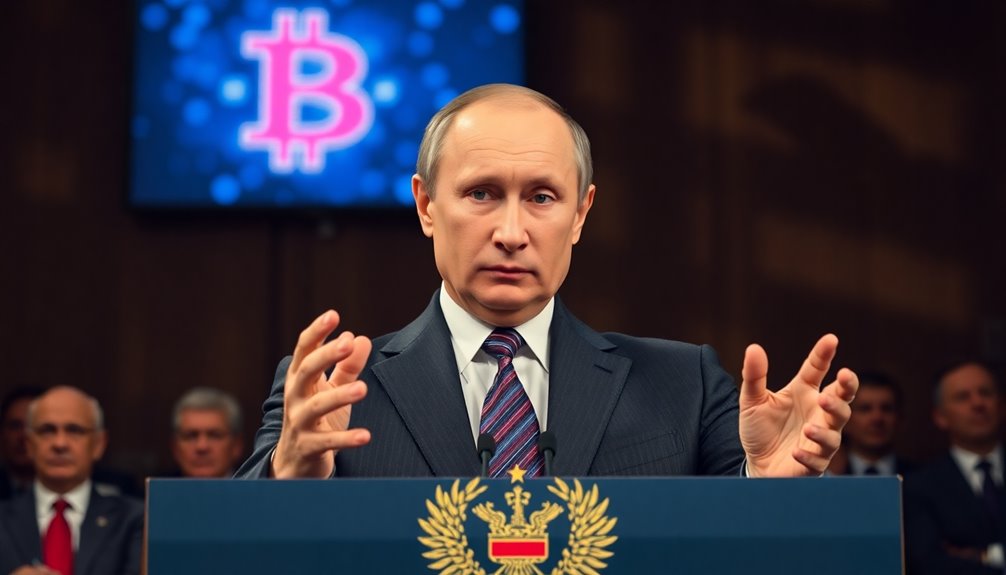
As you examine Russia's response to Western sanctions, it's clear that the nation is shifting its economic strategy. By legalizing cryptocurrency mining and enhancing international trade efficiency, Russia aims to forge a path toward greater economic independence. This transformation not only counters external pressures but also positions digital assets as a cornerstone of its future economic framework. Additionally, the government plans to fund its initiatives through large national projects focusing on technology and workforce development.
Response to Western Sanctions
In response to Western sanctions, the Kremlin has implemented strict capital controls and foreign currency regulations designed to stabilize the economy and maintain financial sovereignty.
Starting February 28, 2022, Russian exporters must sell 80% of foreign currency received from foreign trade contracts, reinforcing a tight grip on foreign currency flows. Additionally, residents can't lend to foreigners in foreign currency or transfer funds to foreign banks without stringent requirements, limiting your financial flexibility. This approach reflects the need to counteract currency devaluation pressures amidst ongoing economic challenges.
The impact on financial transactions is significant. Public companies can buy back their shares under specific conditions until December 31, 2022, but banks can open accounts for individuals remotely only when transferring funds between banks. Restrictions on using foreign currencies complicate everyday transactions.
Economically, Russia's 2024 budget prioritizes military spending, projecting defense expenditures at 6% of GDP, a historic high.
While social spending will see a slight increase, education and healthcare budgets will remain stagnant. The budget deficit is expected to decrease, reflecting a long-term strategy amid ongoing sanctions.
In this landscape, Russia's push for de-dollarization aims to shift financial reliance towards local currencies, even as challenges persist due to the dollar's global dominance.
Legalization of Cryptocurrency Mining
Amid ongoing sanctions, the Kremlin recognized the potential of cryptocurrency mining as a strategic economic policy shift. On August 8, President Putin signed a law that legalizes this burgeoning sector, introducing key concepts like digital currency mining and mining pools.
Only registered Russian entities and individual entrepreneurs can mine, although individuals can participate without registration if they stay within government-mandated energy limits. This law aims to create conditions for legal mining operations and ensure compliance with Russian laws and regulations.
This legal framework opens the door for significant economic benefits. In 2023, Russia mined around 54,000 Bitcoins, valued at approximately $3 billion, and the mining sector could generate up to 50 billion rubles in tax revenue for the government.
Experts predict a 20-40% growth in the industry by 2024, driven by favorable conditions like low electricity costs and favorable climatic conditions in regions like Siberia.
The legalization is expected to attract more investors and stimulate infrastructure investments, creating new job opportunities.
With BitRiver leading the charge, the growth dynamics appear promising, positioning Russia as a dominant player in the global crypto mining landscape.
This move not only strengthens the economy but also enhances the nation's resilience amid external pressures.
Enhancing International Trade Efficiency
Increasingly, countries are turning to cryptocurrencies to enhance international trade efficiency, especially in light of escalating sanctions. By leveraging digital currencies, nations can bypass traditional financial systems, which often fall under the control of Western powers. This strategic shift not only counters sanctions but also promotes economic stability. Additionally, recent statements by Putin regarding Bitcoin's inevitability highlight the growing acceptance of cryptocurrencies as viable alternatives. As nations embrace this shift, they also face the need to evaluate potential tax benefits associated with cryptocurrency transactions.
Here are some key benefits of utilizing cryptocurrencies for international trade:
- Reducing Financial Inefficiencies: Digital currencies streamline cross-border payments, minimizing transaction delays and costs.
- Alternative to US Dollar: Countries are exploring cryptocurrencies as a global reserve asset, reducing reliance on the dollar and its political implications.
- Mitigating Sanctions Impact: Cryptocurrencies provide a lifeline for nations facing frozen assets, allowing for uninterrupted trade during conflicts.
- Fostering Economic Cooperation: Nations are collaborating to create cross-border payment systems, enhancing trade relations among BRICS countries and beyond.
As more countries adopt these digital solutions, the landscape of international trade is transforming, creating a new paradigm that challenges the dollar's dominance and promotes a more decentralized economic future.
Recent Legislation and Regulations

Recent legislation and regulations surrounding cryptocurrency in Russia have marked a significant shift in the government's approach. Cryptocurrency mining has been legalized, with miners now required to submit information to relevant agencies for tracking.
If you're an individual miner operating within government-set energy limits, you won't need registration, but you must report your activities to the local financial monitoring service and provide your wallet addresses to security services. Keep in mind that mining might be banned in certain regions at the government's discretion.
The Central Bank of Russia (CBR) has taken regulatory control over cryptocurrency transactions, piloting cross-border transactions using cryptocurrency starting in September. This initiative aligns with the CBR's aim to integrate cryptocurrency for international trade amidst ongoing sanctions.
While the existing ban on cryptocurrency payments inside Russia remains, the CBR is testing a central bank digital currency (CBDC), with a digital ruble launch expected by 2025.
Digital currencies are recognized as property under Russian law, and you'll face a progressive tax system on income from transactions—13% up to 2.4 million rubles and 15% above that.
Also, corporate tax rates for mining activities will be set at 20% starting in 2025, but crypto mining is exempt from value-added tax (VAT).
Impact of Sanctions on Russia
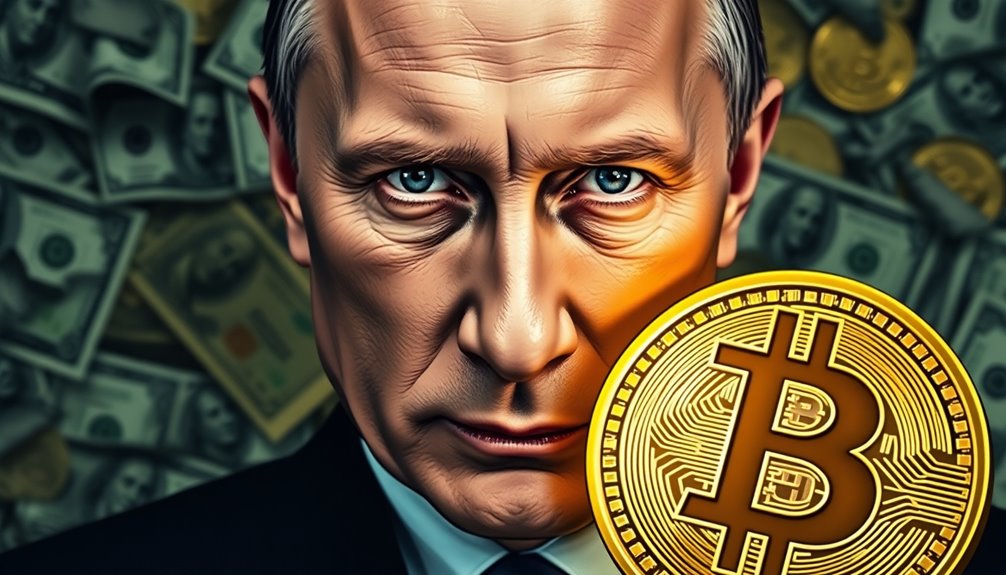
The impact of international sanctions on Russia's economy has been profound, reshaping various sectors and creating significant financial challenges. Sanctions have crippled many industrial sectors, leading to decreased production and financial instability. The rouble's value plummeted by about 30% after the invasion, causing widespread panic among citizens who rushed to withdraw their savings.
Here are some key consequences of the sanctions:
- Budget Deficit: The sanctions have widened Russia's budget deficit, severely affecting government finances.
- Trade Disruption: Supply chains have been disrupted, leading to shortages of critical goods, including medicine and airplane parts.
- Currency Isolation: Trading in US dollars and euros on the Moscow Exchange has ceased, pushing Russia to favor the Chinese yuan.
- Energy Revenue Loss: The price cap on seaborne oil has drastically cut federal tax revenue, which is heavily reliant on energy exports.
- Emergence of Crypto: To counteract economic pressures, the country is increasingly turning to cryptocurrencies as a countermeasure to facilitate international trade and reduce reliance on traditional currencies.
As these sanctions continue to isolate Russia from the global financial system, the country is forced to adapt, seeking alternative markets and strategies to mitigate their economic fallout.
Growing Adoption of Cryptocurrencies
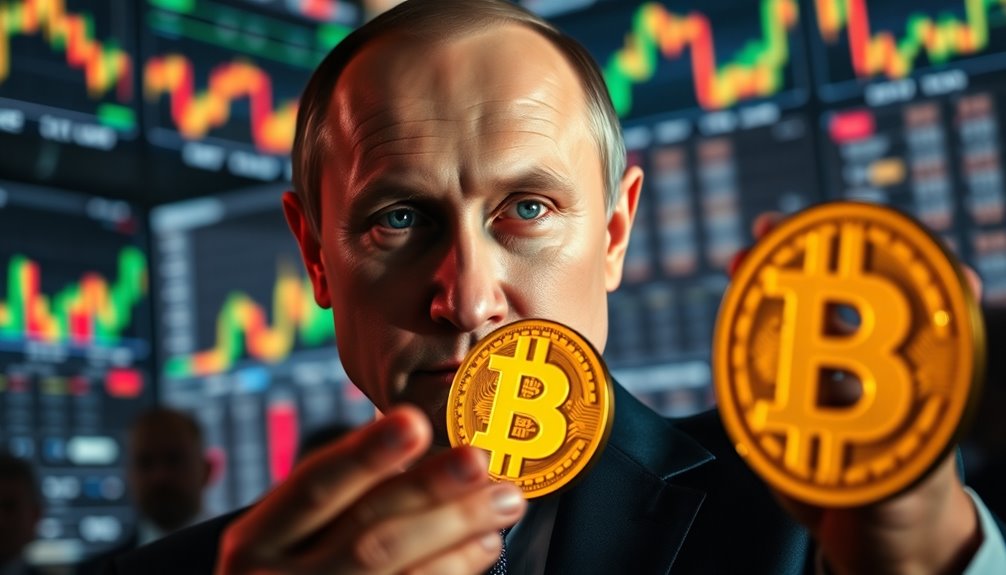
Growing Adoption of Cryptocurrencies
Cryptocurrencies are becoming an essential part of the global financial landscape, especially as traditional systems face challenges. In 2024, Central and Southern Asia and Oceania lead the way in crypto adoption, with seven countries ranking in the top 20.
While high-income nations have seen a slight pullback, lower-middle-income countries have driven growth, indicating that interest in crypto is widespread across various income brackets.
Younger individuals are more engaged with cryptocurrencies, with 20% of millennials getting involved compared to just 4% of baby boomers. Notably, Asian millennials report the highest participation rates at 27%.
Despite men being twice as likely to transfer funds into crypto, women are also increasingly participating, with median transfers of $400 compared to men's $1,000.
The global crypto market is projected to soar from $3.8 billion in 2024 to $13 billion by 2034, fueled by innovations in DeFi and NFTs. Central & Southern Asia and Oceania have emerged as leaders in this growth, showcasing the diverse engagement in crypto adoption across regions.
As blockchain technology enhances transaction security and transparency, adoption is set to broaden even further, drawing diverse users into the cryptocurrency ecosystem.
With regulatory scrutiny on the rise, the landscape is evolving rapidly, making the future of crypto incredibly promising. As governments and financial authorities worldwide tighten their oversight, the industry is beginning to adapt in innovative ways to ensure compliance while retaining its decentralized ethos. At the same time, new trends are emerging, such as bitcoin’s move into risky DEX environments, which has sparked debates about security and user responsibility. These developments underscore the need for balanced regulation that fosters innovation while safeguarding investors and platforms from potential vulnerabilities.
Bitcoin as a Global Reserve Asset
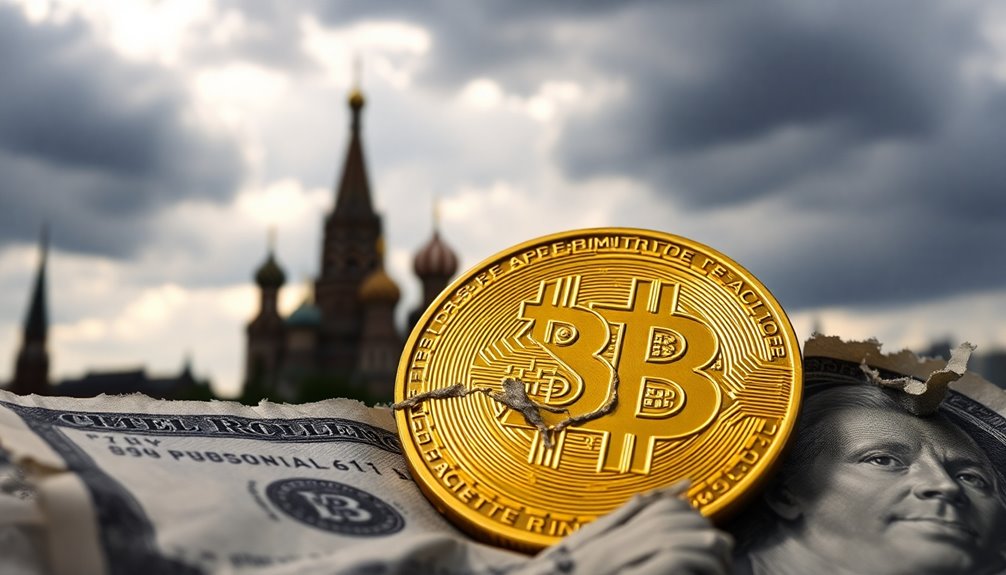
As you explore the idea of Bitcoin as a global reserve asset, you'll notice its potential to stabilize economies while challenging the dominance of the US dollar. This shift could reshape global financial dynamics and offer countries a hedge against geopolitical risks. Understanding these implications is essential as nations look for alternatives to traditional reserve currencies; however, Bitcoin's price volatility raises concerns about its effectiveness as a stable reserve asset. Moreover, the use of strategies like diversification can help mitigate these volatility effects, making Bitcoin a more viable option for long-term economic stability.
Bitcoin's Stability Potential
Exploring Bitcoin's stability potential reveals its unique characteristics that position it as a viable global reserve asset. Unlike traditional currencies, Bitcoin's fixed supply schedule safeguards against inflation, making it a long-term store of value. Its decentralized nature guarantees that no single government or institution can manipulate it, providing a neutral ground for global transactions.
Consider these key aspects of Bitcoin's stability:
- Long-term Store of Value: Bitcoin retains value over time, acting as a hedge against economic instability and inflation. Additionally, it is crucial to understand the importance of risk management strategies to protect investments during market fluctuations. Implementing diversification strategies can further enhance the resilience of Bitcoin IRA investments.
- Liquidity and Market Performance: High liquidity allows for easy trading, with a positive monthly return mean of 7.8% from 2016 to 2024. Additionally, reports indicate increased interest from Asian central banks in integrating Bitcoin into their reserves.
- Decentralized and Neutral Nature: It's immune to governmental whims, protecting you from sanctions and counterparty risks.
- Volatility and Stability Considerations: While it has experienced volatility, periods of low realized volatility often precede significant price increases.
These characteristics underline Bitcoin's growing role as a reserve asset, offering not just stability but also resilience in turbulent times.
As the global economy shifts, Bitcoin's potential as a stable alternative to fiat currencies becomes increasingly apparent.
Diminishing Dollar Dominance
The shifting dynamics of global finance are driving a reevaluation of currency dominance, particularly in the wake of geopolitical tensions and economic instability. As Western nations freeze Russian reserves and wield the dollar as a political weapon, countries are seeking alternatives.
BRICS nations, united in their opposition to the US, are actively exploring de-dollarization efforts, which include new international payment systems. Notably, BRICS collectively represents over 25% of the global economy(25% of the global economy), highlighting their growing influence in reshaping financial systems.
Amidst this backdrop, Bitcoin emerges as a contender for a global reserve asset. Its decentralized nature makes it resistant to government control, unlike traditional currencies. With concerns over dollar debasement growing, Bitcoin is increasingly viewed as a hedge against economic uncertainty. This appeal is particularly strong in lower and middle-income countries, where access to financial services is limited.
While the dollar still holds significant sway, the momentum towards alternative assets like Bitcoin is undeniable. As BRICS expands and seeks to diminish reliance on dollar-based transactions, Bitcoin's role as a viable alternative becomes more pronounced.
The potential erosion of dollar dominance could position Bitcoin favorably in international trade, marking a significant shift in the landscape of global finance.
Global Economic Implications
Recent developments suggest that Bitcoin could emerge as a viable global reserve asset, challenging the long-standing dominance of the US dollar. As countries like Russia endorse Bitcoin for international trade, you might wonder about the broader implications of this shift. Here are some key points to reflect upon:
- Strategic Economic Shifts: Countries are looking to navigate sanctions and reduce reliance on the dollar by adopting Bitcoin.
- Cross-Border Payments: Bitcoin simplifies international transactions, potentially lowering costs and enhancing financial inclusion, especially in developing regions. With 40% of American adults now owning crypto, the growing acceptance of Bitcoin may further accelerate its use in global trade.
- Regulatory and Economic Impacts: For Bitcoin to gain mainstream acceptance, coordinated regulations are essential, which could disrupt traditional banking systems.
- Global Adoption Benefits: Countries accumulating Bitcoin may experience improved financial stability, paving the way for a more equitable economic landscape.
This shift could redefine global finance. If Bitcoin continues to grow as a reserve asset, it might give nations more control over their economic policies and foster innovation within their financial systems.
As these dynamics evolve, the future of the dollar's dominance hangs in the balance.
Critique of the US Dollar

Critics argue that the US dollar's dominance is both a blessing and a curse, creating imbalances that can destabilize the global economy. While the dollar accounts for a staggering 58.36% of official foreign exchange reserves, this dominance allows the US to maintain higher trade deficits without immediate consequences. You see, the US absorbs savings and demand imbalances from other countries, which could lead to increased American indebtedness over time. Moreover, foreign demand for the dollar can inflate its exchange rate, even when economic indicators suggest otherwise. This situation complicates global trade, as many countries start to reevaluate their reliance on the dollar in light of geopolitical tensions. Countries like China and Russia are exploring alternative financial channels, further challenging the dollar's stronghold. In fact, the dollar's share in global reserves has remained around 60% as of 2021, highlighting its persistent influence despite rising competition. Yet, the risks are high. If non-US holders of dollar-denominated assets suddenly shift to other currencies, the consequences could be dire for the US economy. Escalating trade wars and cyber threats loom large, potentially eroding confidence in the dollar. As countries diversify their reserves, the dollar may face the very real possibility of losing its status as the world's dominant currency.
Implications for Global Finance

Frequently, discussions about the future of global finance revolve around the transformative potential of Bitcoin and other digital currencies. As these technologies gain traction, their implications for global finance become increasingly significant.
You're witnessing a shift that could redefine traditional financial systems and enhance global trade.
- Financial Stability: Bitcoin and blockchain reduce inefficiencies, promoting economic stability. This is largely due to the transparency and security provided by blockchain technology. Additionally, diversification strategies can help investors mitigate risks associated with volatile digital assets. This shift towards digital currencies may also encourage a diversified investment approach among traditional investors. Furthermore, the implementation of AI security solutions can protect digital assets from emerging cyber threats.
- Cross-Border Transactions: Digital currencies enable quicker, cheaper payments, challenging traditional systems.
- Inclusivity: They democratize financial services, reaching those often excluded from banking.
- Disruption of Traditional Models: Companies are innovating in areas like supply chain management and data security.
This new landscape not only enhances transaction efficiency but also fosters a more inclusive financial system.
With lower fees and faster processing, you'll find that digital currencies make cross-border trade more accessible.
As traditional institutions adapt, the integration of Bitcoin into everyday transactions reflects a broader acceptance that could reshape the global economy.
The ripple effects of these changes could lead to a rethinking of financial stability and regulatory frameworks worldwide, ultimately ushering in a new era of financial interaction and commerce.
The Future of Cryptocurrency in Russia

How will Russia's evolving stance on cryptocurrency shape its economic landscape? As you navigate this shifting terrain, you'll notice that Russia's legal framework for cryptocurrencies is gaining clarity. Digital currencies are recognized as property, and with mining now legalized for registered entities, the sector is poised for growth.
If you're a miner, you can operate without registration as long as you stay within set energy limits. However, compliance is essential; reporting to local authorities can save you from hefty fines. Additionally, mining operators are required to report to local authorities or face fines, ensuring that the government maintains oversight of the industry.
With around 13 million Russians already involved in crypto operations, the potential for economic impact is significant. The government anticipates collecting up to 200 billion rubles annually from miners, a substantial addition to state revenue.
Moreover, the Central Bank is exploring infrastructure for cross-border crypto payments, signaling a shift towards broader acceptance. Yet, the existing ban on crypto payments domestically means you'll need to tread carefully.
The legislative push aims to create a controlled yet supportive environment, positioning cryptocurrencies as tools to circumvent sanctions and lessen reliance on the US dollar. In this evolving landscape, staying informed will be key to leveraging the opportunities ahead.
Frequently Asked Questions
How Does Bitcoin Mining Work in Russia's New Regulations?
In Russia's new regulations, you'll need to register your business for legal Bitcoin mining.
If you mine as an individual, you can operate without registration as long as you stay within specific electricity limits.
You must report your activities to local financial monitoring and provide your wallet addresses to security services.
Keep in mind, the government can ban mining in certain regions, so stay informed about local policies and compliance requirements.
What Risks Does Russia Face by Adopting Bitcoin?
By adopting Bitcoin, you face several risks.
Regulatory uncertainty could create inconsistent environments, harming investor confidence. Economic volatility makes Bitcoin's value susceptible to market stress, and its dependence on the US economy ties its fate to fluctuations in the dollar.
Additionally, integration challenges with trading partners may hinder its use for payments, complicating efforts to bypass Western financial systems.
These factors can jeopardize your strategy and Bitcoin's long-term viability in Russia.
How Will Bitcoin Transactions Be Taxed in Russia?
In Russia, you'll find that Bitcoin transactions are taxed like securities.
If your annual earnings are under 2.4 million rubles, you'll pay a 13% personal income tax. For earnings above that threshold, the rate jumps to 15%.
Additionally, you can deduct mining-related expenses.
However, keep in mind that the purchase price of cryptocurrencies can't exceed the market quote plus 20%.
Compliance with these rules will be essential for your transactions.
Are There Any Cryptocurrencies Banned in Russia?
In Russia, cryptocurrencies aren't outright banned, but their usage is heavily restricted.
You can't use them as money substitutes, and domestic transactions are prohibited.
While international trade allows for some use of digital financial assets, mining is specifically banned in occupied territories and certain regions like Donetsk and Lugansk.
Seasonal restrictions will also apply in Siberia, limiting your ability to mine during winter months.
What Are the Potential Environmental Impacts of Crypto Mining in Russia?
Crypto mining in Russia can considerably strain local ecosystems due to its high energy and resource consumption.
You might notice that increased mining activity contributes to energy deficits, leading to potential shortages.
Additionally, while specific water usage data isn't available, globally, Bitcoin operations consume vast amounts of water, raising concerns in water-scarce areas.
If not managed sustainably, these activities could exacerbate environmental issues, impacting both the landscape and local communities.
Conclusion
Putin's endorsement of Bitcoin signals a seismic shift in global finance, reminiscent of the way gold once challenged monarchies. By positioning cryptocurrencies as a viable alternative to the dollar, Russia could spark a renaissance in digital assets, reshaping economic power dynamics. As countries seek refuge from sanctions, the rise of Bitcoin might not just be a trend—it could be the dawn of a new financial order. Keep an eye on this unfolding narrative; it's bound to change the game.

